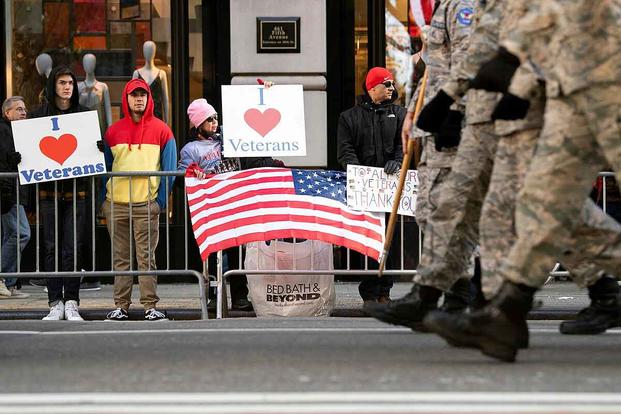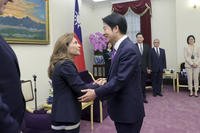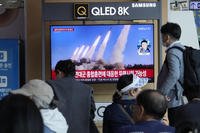The walk-in veteran was a Brooklynite on a break from driving a Transit Authority bus through deserted streets haunted by the constant wail of ambulance sirens carrying away the latest victims of a killer virus.
He just had to unload to someone about how social distancing and other restrictions to keep people apart -- all unnatural acts for an in-your-face city -- were getting to him.
"At one point, he got emotional," Gabe Botero, an Iraq veteran and licensed clinical social worker at the Brooklyn Vet Center, said of the bus driver. "This is a tough time for everyone."
Related: Military Doctors Relieve Worn-Out Staff in NYC Hospitals
Botero let him vent and gave assurances that he was not alone, that the Vet Center was there for him with mental health counsellors available in person, through teleconferencing or just a phone call.
The driver went back to his route, but returned later with coffee for everyone in the Mobile Vet Center. It was just one memorable encounter of many for Botero and three other Department of Veterans Affairs workers during a five-day, 200-mile outreach mission last month to all five boroughs of the city.
The van itself is an outreach tool.
"People walk by and say -- 'Hey, what's this?' It gets them in the door," Botero said in an interview Monday. Inside the vehicle, he said, partitions can be moved around for individual counseling.
Some who came in were cops and firefighters, many of them veterans, in need of counseling on how to deal with the stress of carrying out their duties in a stressed-out city. Others were veterans who had just lost a loved one to coronavirus, Botero said.
The message his team had to offer is simple.
"We know you guys are dealing with stress and anxiety, we know that these are difficult times, and so we really just want to try to help you reduce that stress, reduce that anxiety, and offer practical solutions that can help," he said.
The stress and anxiety are simply the reality of being in the city hit hardest by the novel coronavirus. New York Gov. Andrew Cuomo said Wednesday that another 752 victims of COVID-19 in the city had died in the last 24 hours.
In addition, the city's Health Department reported that about 3,700 deaths whose causes had been unattributed were likely the result of coronavirus. If those deaths were added to the official count, then more than 10,000 city residents have died of COVID-19 since the outbreak began.
The solutions to getting through the age of coronavirus may seem trite, but they can work, Botero said.
"The biggest thing we're dealing with -- people are quarantining, social distancing. We really want to work with them on creating a new normal. People have difficulty with the unknown and, now more than ever, all of this is unknown," he said.
He advises vets to "create a routine, encourage some healthy habits, maybe go for a walk, meditation, exercise -- anything that helps flatten that curve and find a new normal. That's what we're doing."
They are particularly concerned for veterans who are already coping with post-traumatic stress, or PTSD. The message for them is that many of the counselors at the six Vet Centers in the city are combat veterans themselves.
"We're New Yorkers; we live in the city. We're dealing with this ourselves," Botero said.
The van Botero took around the city in mid-March was the first Mobile Vet Center deployed by the VA during the crisis.
The mobile centers "help VA reach those who may not otherwise seek VA services for counseling and mental health support," officials said.
"Vet Center staff can assist those who may be facing extreme isolation during this period of 'social distancing' -- a practice that is needed to reduce the COVID-19 infection rate -- but one that may likewise increase the vulnerability of some veterans," the VA added.
Mobile Vet Centers have also been sent into San Francisco; New Orleans; Los Angeles; Portland, Oregon; and Pasadena, California.
The VA also plans to send them into Seattle, Chicago, Miami and Phoenix, said Mike Fisher, chief officer of the VA's Readjustment Counselling Service.
Fisher has charge of 83 Mobile Vet Centers, all 300 Vet Centers nationwide and the Vet Center Call Center.
During the pandemic, "We have seen a shift to more virtual services," he said.
In March, the Vet Centers conducted more than 47,000 virtual appointments, a 200% increase over February, Fisher added. But he stressed that the brick-and-mortar Vet Centers are still open to those who can get there.
"We are seeing that increase" in virtual services, but "even with that increase, we're still providing that face-to-face connection" at the Vet Centers in an environment that's safe for the veteran and the counsellor, he said.
"We're in the business of building community," Fisher said. "The response to this virus highlights that that's going to be our challenge."
The American Legion is also responding to the challenge of connecting with veterans in isolation by reminding members of their "Buddy Check" system.
"If ever a veterans-service program was built for pandemic relief, it's the Buddy Check," Legion National Commander James W. "Bill" Oxford said in a statement Monday.
"Legionnaires are using the phone, email and social media to safely find out how these veterans are doing and what we can do to help them. They might need something from the store or pharmacy," he said. "Sometimes, for a veteran who is alone and on orders to stay home, the most important thing is a phone call."
-- Richard Sisk can be reached at Richard.Sisk@Military.com.
Read More: Air Force Tests Ability to Mass-Evacuate COVID Patients












